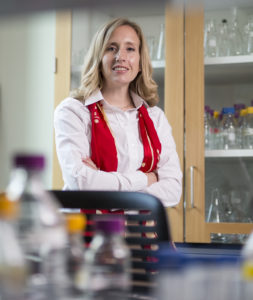Cynthia Reinhart-King receives $1M W. M. Keck Foundation Grant
A bold engineering approach by a Vanderbilt University researcher to sort breast cancer cells based on their behavior first has produced compelling data that show less migratory cells create more metastases, contradicting the prevailing hypothesis on how cancer spreads.
Expanding this ambitious research by Cynthia Reinhart-King, Cornelius Vanderbilt Professor of Engineering, to other highly metastatic and lethal cancers will be supported by a three-year, $1 million grant from the prestigious W. M. Keck Foundation. The grant is one of those awarded nationally this year for medical research projects “that are high-risk with the potential for transformative impact,” according to the foundation.

Preliminary discoveries by Reinhart-King, professor of biomedical engineering, have led to surprising results. The ability of cells to move is viewed as integral to the ability of cancer to spread to secondary sites. However, Reinhart-King is changing that paradigm.
“We have acquired significant data that show it is not the most migratory cancer cells that lead to the most metastases in the body,” Reinhart-King said. “The impact of this work will be far reaching. Identifying new genes and cellular behaviors that drive metastasis can potentially shift the cancer research community’s focus onto better targets to prevent cancer progression.”
